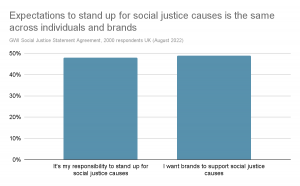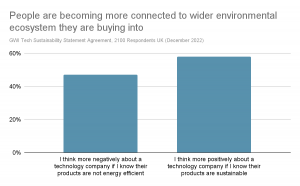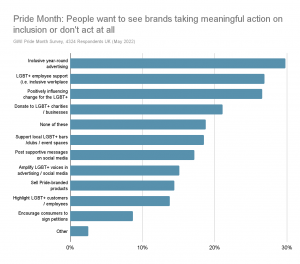As technology evolves, so too does our ability to understand the impact a brand is having. A few years ago the switch in emphasis from ‘share of voice’ to ‘share of search’ helped us to see the intentions and key terms associated with our brands. It’s a powerful metric, but needs to be understood in the context of how your brand is being perceived. Aaron Maughan, Senior Insight & Strategy Manager at Manifest Group, explains why measuring brand sentiment has become as important as measuring consumer behaviour when unlocking growth opportunities.
Your business exists as an aggregation of your clienteles’ opinions. In some cases these are people looking for quick treats in the FMCG sector, in other cases it’s potential investors who can help your business scale. Whoever it is you’re talking to, make sure that you’re clear on what their sentiment towards your brand is.
Word of mouth is becoming increasingly important across our digital ecosystems, with end users citing friends and family as key influences in their purchase decision. Whether an audience group trusts a brand – to deliver, to create, to act – is one of the most important parts of the sales funnel, regardless of what you’re selling.
The term ‘corporate citizen’ isn’t new, but it’s a useful lens to view decisions about your brand through and ensure that you’re building trust. With a tough outlook ahead for many, now is the time to make trust a central part of your brand to unlock growth opportunities.
Building corporate citizenship into your brand growth strategy
Putting trust at the heart of brand loyalty
One major behavioural shift from the pandemic was that brand loyalty (and retention) has declined since the pandemic as customers seek better experiences.
At the outbreak of the pandemic, 62% of global consumers believed that brands played a critical role in helping countries to address the challenges it brought, which started a shift in where we found value. For some of us this meant building closer ties with local and independent businesses, for others it was a pricing war for the best experience at the lowest cost. Either way, we were forced to think about the role the brands we engage with behave in wider society.
Shared accountability with end users
In turn, this shifted our expectations for brands. We’re better connected to the wider actions of a business through social media and the rise in citizen journalism and 71% of people globally would agree that if they perceive a brand to be putting profit over people, they’ll lose trust in it forever.
This includes the pressure to act in environmentally friendly ways, ensure ‘ethical purchases’ when possible (employees are paid fairly, DE&I initiatives are being followed etc) and contribute to a fairer economy.


What steps do we need to take?
The crux of this is showing up in the right ways for your business:
- Bring the receipts. There are so many good intentions behind brand activations around calendar moments like Earth Day and Pride, but make sure you’ve done the due diligence for your business. It’s ok if you’re not quite there yet – the key thing is having a clear and transparent plan for your role as a corporate citizen.
- Respond, don’t react. It can be tempting to share messages of solidarity in your brand comms. This is a great start but audiences are looking for impact. You need to show that you’re listening to people. But listening is just the beginning. People expect to see action taken from a business. In the UK, 70% of people think that brands should stop working with celebrities if they do something offensive.

For some this will be a matter of hygiene. For others it may require a full ESG strategy. Either way, it’s important that business leaders have these conversations now. More consumers are faced with changing their buying decisions and seeing your business in the wider societal context will influence this.
How do we know we’re having the right impact?
- Confidence to act. This requires a clear brand mission, purpose and values. As long as an action is ingrained with these, take action.
- Knowing when to shut up. Not every occasion requires comment or action from brands. Even if it’s tempting to do so, if the business can’t back up key claims then don’t speak.
- Understand brand sentiment – from online conversations, unprompted awareness and end user experience – it all helps to build a better brand. Link these to key associations you want to make with the wider ecosystem. We’d recommend ‘trust’ being one of these but it might be ‘sustainable’, ‘inclusive’ etc.
- Metrics that matter. Got a USP? Great. Got a mission? Awesome. Now build metrics that connect the two to sentiment and growth
CTA: To find out more on building and measuring positive brand impact, contact hello@manifest.group. Visit:https://slant.manifest.group/ for more commentary and insight from the team.
___
References:
- 34% of consumers discover brands through recommendations from friends and family, topped only by ‘ads on TV’ (35%) and ‘search engines’ (37%), GWI Brand Discover Survey UK, 2022
- Trust Barometer Special Report: Brand Trust and the Coronavirus Pandemic, Edelman (March 2020)
- Trust Barometer Special Report: Brand Trust and the Coronavirus Pandemic, Edelman (March 2020)
- GWI Celebrity Endorsement Statement Agreement, 2200 Respondents (November 2022)
___
About Manifest Group:
We are an award-winning unified agency on a mission to build brands that change the world. With studios in London, New York, Stockholm, Manchester, Melbourne and Los Angeles, Manifest Group is born of the belief that great marketing is no longer about selling products but starting movements. It is our unwavering belief that brands and organisations have a capacity to change the world for the better. To elicit a positive impact on the lives of their audiences. And for their marketing campaigns to not only raise awareness of these impacts, but to amplify them.
We manifest this potential as a commercial advantage — driving both the success and the significance of the brands we build. We provide a catalyst for a different approach to business; whereby growth is not measured solely in financial terms, but through positive impacts on people and the planet they live on.
For more information or further comment please contact: hello@manifest.group


